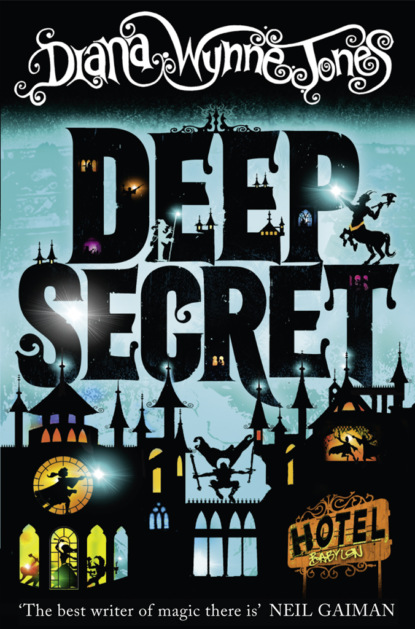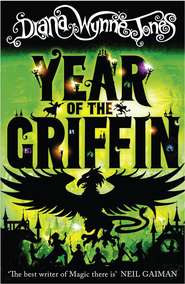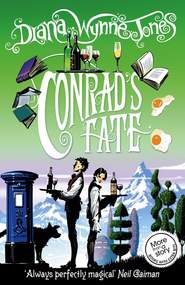По всем вопросам обращайтесь на: info@litportal.ru
(©) 2003-2024.
✖
Deep Secret
Настройки чтения
Размер шрифта
Высота строк
Поля
There was one of Stan’s unhappy pauses. Then he said, “I don’t think I can, lad. I seem to be confined to your house.”
“Are you sure?” I said. “Where else have you tried to go?”
“Beyond the garden gate. Past your barn at the back. I couldn’t manage either direction,” he said.
I was annoyed. It had been a tiring few days. “What’s the good of having a ghostly adviser, if you can’t be around to advise me?” I demanded. “I was relying on your opinion about this girl.”
“Then stand on your own feet for a change!” his voice retorted. “It’s what Them Up There seem to want you to do.”
I knew I had hurt his feelings. He did not speak to me again that night, and I heard not a word from him in the morning, not even when I arranged for him a floating stack of CDs, each one magically programmed to hop in or out of the CD player when he gave it the word. I was proud of that magic. And I considered it thoughtful too. So I was offended in my turn. I went out to my car in chilly silence and found Andrew waiting beside it.
Andrew is actually a good passenger. He does not make conversation, or talk about other motorists, or make nervous comments on how fast I drive (which is fast). He just sits there. This sometimes gets unnerving. When I got particularly unnerved – the first time was two-thirds of the way round the M25 – I asked him about his latest invention. And he told me, in his deceptively slow and meditative way, which nevertheless described the thing – he called it a “swing-ratchet” – so accurately that I could probably have done drawings and patented it myself. Then he stopped talking.
Some way down the M4, I became unnerved again. But I felt it was my turn to tell him something. Usually when I drive him anywhere I tell him about any software problem I have lately run into. Very often he has set me on the right lines just with one of his slow, wandering responses. This time, however, my problems had been something of a deep secret. There did not seem to be any way to talk about them. Or was there? In a world tending Naywards like ours, no one is going to suspect you are talking about a collapsing Empire three universes away.
“Tell me,” I said, “what would you think if you found the password you needed to access someone else’s program was a sort of secret codeword the programmer shouldn’t really have thought of using in that way? I mean, suppose the password was something silly like Humpty-Dumpty to a very serious program – say, something about genetics – and you knew that Humpty-Dumpty was actually a codeword for something equally serious – say, classified military information. What would you think? Would you put it down to coincidence, or what?”
Andrew said ruminatively, “I’m told there is no such thing as coincidence.”
I was told that too and, what is more, told it as a Magid, which made it very significant. But it seemed to me that Andrew was just uttering a platitude. I was disappointed.
He said, “Is there no chance the user of the password hacked into the other classified material?”
I said, “Well, it’s always possible,” to cover up what I was really talking about, and added, “but it’s unlikely to many decimal places. Virtually impossible, in fact.”
“If it’s that unlikely,” Andrew meditated, “then I reckon you have to go back in time, to some wee point where the codeword was known to someone who told it to both parties – a teacher who recited ‘Humpty-Dumpty’, to take your example, and both users learnt it from him. And this teacher would have given both of them the idea that the words were somehow important, maybe – but that is not essential.”
“That,” I said, “is very true.” I drove digesting this thought. Were Magid secrets known in the Koryfonic Empire sometime in the past? I did not think they were supposed to be known there now, any more than they should be known here on Earth. There are some things that even Ayewards worlds should not know yet. But there are always hints, vestiges of knowledge both from the past and the future, that Magids leave for people to pick up when the time is right. Babylon was certainly one of those. I suppose it worried me that Timos IX was an unlikely person to be interested in such a hint.
Here Andrew startled me, the way he often did, by saying musingly, “There is very seldom any true secret.”
“Right,” I said. “Things get out. Look at King Midas and his ass’s ears.”
I don’t think either of us said anything else until we reached Bristol and he asked to be dropped by the Nails. I got lost getting him there. It was midday or after when I finally dropped him. “When do you want to be picked up?” I asked him.
“Oh,” he said, and thought. Then he gave the smile that always made me realise he was not the absent-minded fool he often seemed. It changed his distraught, neurotic face quite radically, so that you saw there was a deep mind behind it. “I’ll find my own way home,” he said. “I don’t know how long I shall need to be here.”
That was a relief. It meant my time was my own. I found a promising Italian restaurant and treated myself to a good leisurely meal. Later, I was glad I did. The rest of that day was pure frustration. It was typical of the hunt for Mallory. And I still don’t see how she did it, but I am sure now that it was all her doing.
First, I lost the place where I had parked my car. When I found it, it had acquired a parking ticket. Then I got lost again driving to Mallory’s new address, regardless of the fact that I had been to the street before, and when I did get there, there was nowhere to park, in that street or the next. It was after three when I finally rang the bell of the tall, smartly painted Regency house.
The woman who answered the door was as smartly painted as the house. She would probably have been good-looking, in a dark, gypsyish way, if she had not worked so hard at it. Under the make-up, her face had the look of someone who dieted fiercely. Her dark hair had been enhanced with bronze streaks and her strenuous slimness enhanced by a tight black skirt and a designer jumper. The jumper fascinated me. It was one of those which have a white satin pattern, sewn with beads, randomly appliquéd to one shoulder. It was the most pointless pattern I had even seen. So fascinated was I that it took me a moment even to realise that she was too old to be Maree Mallory. She was in her mid-thirties at least.
She tapped the doorframe with a shapely red fingernail and said, “Yes?” impatiently.
“I’m sorry to disturb you,” I said. “I’m looking for Maree Mallory. About a legacy.”
As I spoke the name “Maree” her face hardened. It was clear she hated Maree and now disliked me by association. “I’m afraid my niece has just gone out,” she said. I could tell she was pleased to frustrate me.
I said, “Have you any idea when she might be back?”
“Not the foggiest,” she said, with evident pleasure. “When my niece takes it into her head to go gallivanting, it’s anyone’s guess how long she’ll be gone.” Then she added, as if it were a major tragedy, “She took my son Nick with her too.” Her manner suggested that Maree had torn the infant from her arms.
“I’m sorry to hear that,” I said, to both things. “Do you know where they’ve gone?”
“All I know,” she said, with satisfaction, “is that she drove off almost the moment you rang the doorbell.”
She was right to be satisfied. It is always worse to know you have just missed someone. In the normal way, that is. But for a Magid that is not such bad news. “Thank you,” I said humbly. “Perhaps you could tell your niece that I called.” I gave her a business card. From the way she took it, I could tell that it would be in the wastebin, in pieces, seconds after she shut the front door. I gave a last fascinated look at the design on her jumper – the satin had scalloped edges and two beaded tendrils that impinged hungrily on her right breast – and went away.
Janine, I thought. That had to have been Janine. Poor sick Mr Mallory had correctly pronounced her to be a bitch.
Then I dismissed her from my thoughts, jumper and all, and took out the letter Maree Mallory had written me. Everyone leaves traces of themselves in the air as they go. These last for ten minutes strongly and can be detected for another twenty minutes after that – or more, if the person has a powerful character. In letters, traces of personality can linger sometimes for fifty years. And Maree Mallory had left her strong character all over that letter. All I had to do was match it with any nearby traces.
They were just up the street, those traces, mixed with pungent blue smoke from a car in dire need of an oil-change. I remember at the time misguidedly finding the traces rather agreeable. They had a valiant, pugnacious and even humorous feel – as if Mallory, despite the misfortunes that had evidently befallen her recently, was holding herself together and fighting fate. And Janine had been quite accurate. The girl had been driving out of one end of the street literally as I walked into it the other end. I was – again misguidedly – delighted. I sprinted back to my car and set off in pursuit.
I followed these traces for half an hour. They led me on a tangled trail, through streets broad and narrow, under other streets, over bridges, downhill, uphill so steeply that once I stalled my engine, and out along small snaking roads across green parkland. I saw Regency terraces, pink Gothic towers, modern office blocks, cobbled alleys, Brunel’s iron ship and the M32. From the map that I had spread out on the seat beside me, I reckoned, with growing exasperation, that I had seen every part of the city north of the harbour – and all without once coming within hailing distance of the car I was following. I hadn’t even identified it – let alone discovered what the girl thought she was doing – but since the narrower streets where she had been were invariably pungent with oil, I guessed I was looking for a fairly old car.
Guessing is a mistake. You should keep to the traces. About this point, the trail plunged steeply down to the waterside again. Following it, I saw ahead of me a small dingy Morris with a woman driving and a child’s seat in the back. Ahah! I thought. I gave chase, sending Magid messages to the driver to draw in somewhere and talk. There was no response. I pursued the Morris across two branches of river into a place where a one-way system induced mad circularities and the growing amount of traffic reduced both of us to a crawl. The Morris was always three cars ahead of me and its driver refused to respond to my messages in any way. My frustration mounted with every yard. I would have given up, except there she was, so near.
Then the brown Morris abruptly turned off into a side road and I realised it was not the right car after all. The traces of Mallory had completely vanished. I had probably lost them from the moment I assumed the Morris was hers.
I cursed. I decided to give up and drive home. Then, with uneasy thoughts of Stan’s comments, I supposed that the obvious thing to do was to drive back to the aunt’s house and lie in wait there. I set out to do that, but by then, of course, I was lost again.
I fought through the ever-increasing traffic, looking for a bridge, and no bridge appeared. Instead, I found myself to my bewilderment driving steeply uphill on what was almost a country road. The traffic was appalling. We crawled. More cars came crawling up behind me. I had ample leisure to see I was driving along one side of a very considerable ravine and that the whole of Bristol was now spread out or piled up on the other side of it.
That settles it! I thought. I’m driving home. And resigned myself to having to do it via Wales or something.
But at that point, the traffic ahead speeded up, the city vista vanished behind trees and a notice by the road stated that I could turn right for Bristol via tollbridge. I turned right thankfully. And the tollbridge, when I reached it, was a perilously high suspension bridge across the gorge – a ribbon of road hung from cliff to cliff between two quasi-Egyptian towers. I put money in a slot and rumbled across it dubiously, sparing glances through its sides at a muddy trickle of river flaring in the sunset some hundreds of feet below.
Some fool had stopped a car in the middle of the road just beyond the bridge. I nearly ran into it.
I stamped on my brakes. Squeals behind me told me that a line of other motorists was doing the same. Not only was the car stopped, but its driver’s door was open blocking what was left of the road. There was no room at all to get by because the road was divided by a steep kerb to stop cars going the wrong way on the bridge. Motorists were stopped on the other side of this kerb, staring. The way they stared told me that my first idea – that this was an accident – was wrong. This car had been stopped deliberately. Then I saw its driver.
She was dancing. Dancing on the sidewalk beside her car.
She was a small, unlovely woman in glasses, with a figure like a sack of straw with a string tied round it. And she danced. She bent her knees, she hopped, she cavorted. Her ragbag skirt swirled, her untidy hair flew and her spectacles slid on her barely-existent nose. Beside her, her passenger also cavorted. Both of them waved their arms. Both bounded about. He was a teenage boy, dark and startlingly handsome, and he towered over her in his dancing, rather sheepishly. He had the air of one who was only dancing because she was not going to drive on unless he did. I exonerated him. As for her…
I put my thumb on my hooter-button and held it there. I was not the only one.
The woman stopped twirling, but only to bend at the knees and shoot out her fingers – those fingers were adorned with nails long enough to be classed as murder weapons – flick, flick, flick, towards the road. It was a totally contemptuous gesture. The boy did the same, self-consciously. I could see they were both singing, or chanting something, as they flicked. Then, calm as you please, they both went back to dancing.
I was angry enough to augment the sound of my horn with a blast of magic. It fair bellowed. Behind me, the bridge was jammed solid and half the cars on it were hooting too.
The boy at least noticed. He looked unhappy. But the woman went on dancing and he obediently imitated her. They did another flick, flick, flick of the fingers, this time in the direction of the rocky bank. And then they danced some more. I lost my temper.
I took my thumb off the hooter. I turned off my engine, pocketed my keys and got out of my car. They were doing another flick, flick, flick as I reached the woman’s car. Her keys were inside it, dangling from the ignition. I nearly slammed the door on them – except that then she would have had to pick the lock to get in and no other car would be able to move until she had. Instead, I stalked round the bonnet of her car and confronted the capering pair on the pavement.
“Luck, luck, luck,” they were chanting. Flick, flick, flick.











